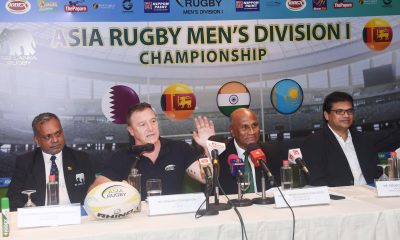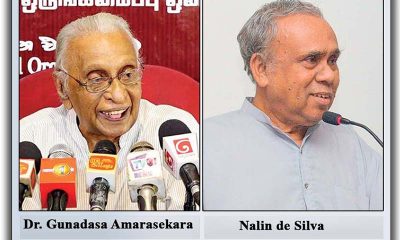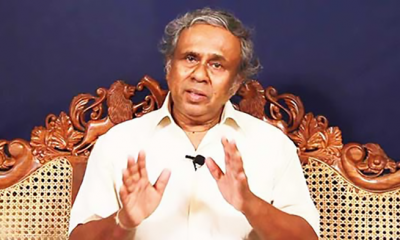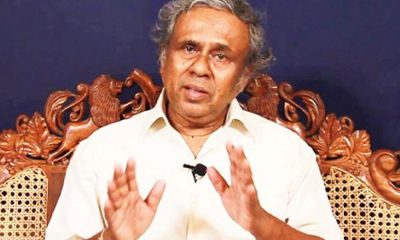Opinion
Nalin de Silva, his world and our worlds
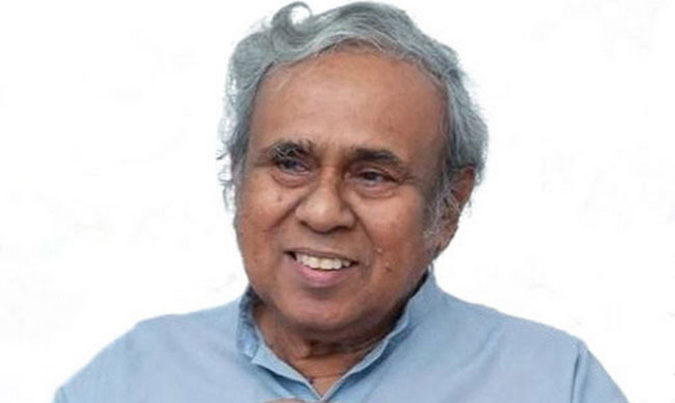
It is hard to think of any Sri Lankan academic who has been vilified the way Nalin Kumar De Silva was. Nalin was not averse to calling out his ideological opponents and not in very polite terms either, but all those epithets essentially boiled down to ‘Pawns of the West,’ nothing more. He was, on the other hand, called racist, chauvinist and warmonger. Some, who obviously were clueless about ‘nation’ would call him ‘nationalist’ as though that was some kind of four-letter word.
There were others who referred to Nalin and his ideological comrade Gunadasa Amarasekera as ‘native intellectuals.’ They probably didn’t understand the word ‘intellect’ and its derivatives. I believe it was Nalin or maybe it was Gunadasa who observed that the term implied ‘international intellectuals.’ Perhaps those who called them ‘native intellectuals’ did so to confer upon themselves the tag ‘international intellectual’ but the very use of the term disqualified them, obviously. Pawns they were and are, Nalin believed.
The more informed, less threatened and less malicious referred to him as one of the two top ideologues of what was known as the ‘Jathika Chinthanaya School’ (the other being Gunadasa). No one has really succeeded in translating ‘Jathika Chinthanaya’ into English. ‘National Ideology’ somehow seems crude and erroneous. Those who subscribed to this school of thought, however, knew. They had a sense.
Nalin passed away in California, USA just a few hours before I started writing this. The final rites will be held from 1 to 5 pm (PST) on Sunday, May 5 at Fremont Blvd, Fremont. It is probably too soon to offer a comprehensive review of his work, as a teacher, political activist and thinker. It has to be mostly anecdotal but maybe that’s all I can do, not having associated with him closely.
Like most people who ‘knew’ Nalin, knowledge came mostly from reading what he has written. ‘Magey Lokaya’ (My world), probably the essay that best captures his theoretical explorations, is probably one of the most influential political treatises of the late 20th century. There were other books which addressed what was dubbed ‘The ethnic conflict’ where Nalin cogently tore apart the creative historiography of Eelamists and their apologists who had many axes to grind with the Sinhalese and/or Buddhists. In addition there were innumerable articles published weekly in the Divaina, Vidusara and later in the Midweek Review of ‘The Island.’ I’ll come to those later.
The first time I met him was when I went to see my friend and teacher Arjuna Parakrama. This was in the early 1990s. We were walking towards the ‘Open Canteen’ of the Colombo University when we ran into Nalin. Apparently the two had agreed to a debate. Arjuna said something about the logistics and added, ‘we must make sure we don’t become pawns of other people.’ Nalin muttered something with a laugh and walked away. Arjuna had heard: ‘he said I am a pawn.’ Arjuna didn’t take it as an insult. I don’t know if the debate did take place, but Arjuna told me years later that Nalin had acknowledged that he, Arjuna, was a good trade unionist. This was when Nalin had been suspended by the university.
My first one-on-one encounter happened in the late nineties. I was a student in the USA at the time and had written to Nalin. I was politically associated with the ‘Janatha Mithuro’ then and felt that Nalin’s ongoing clashes with Champika Ranawaka were unnecessary. I mentioned this. Nalin replied. He was ‘soft’ in the criticism. He merely stated, ‘No one disputes that Champika is very bright, but he should acknowledge the source of his ideas.
’ Champika, after he disassociated himself from the JVP-led student movement, was one of the prominent acolytes of Nalin’s ‘Chinthana Parshadaya.’ Convinced that a political movement and not a forum to discuss ideological/philosophical matters was what was needed, he, along with other young people who had become skeptical about Marxism, launched first the Ratawesi Peramuna and later the Janatha Mithuro. Nalin was one of their strongest critics.
I met him next at the Divaina editorial office. It must have been in 2001. I was working at the Sunday Island but enjoyed spending an hour or two at the Divaina. One day I saw Nalin and after saying hello, asked him if he had come to hand over an article. What follows is the rough English translation of what he told me in Sinhala. ‘No Malinda. You know, it’s a small amount that they pay me, but it is not small for me; even so it is irregular.’ It was the only income he had at the time.
In 2006 in Celigny, Switzerland, at a media opportunity just prior to the commencement of talks between the Government and the LTTE, I casually asked Jehan Perera of the National Peace Council who happened to be there, ‘how many people could you get to Lipton Circus for a protest if you didn’t have funding?’ Jehan, ideologically at odds with me though he was, offered an honest response: ‘probably none.’
That was the difference. The NGOs had bucks. They had, in 2002, a government committed to federalism and a president who was not in disagreement. They had both the private and state media at their disposal. The nationalists had Nalin and a few others.
The 1990s were all about federalism. Those opposed to federalism were called warmongers, racists and chauvinists. Nalin got a lot of that. And yet, after it had led to the ridiculous Ceasefire Agreement signed on February 22, 2002 and the consequent pantomime of ‘peace’ talks, federalism became a joke. The UPFA routed the UNP in April 2004 and Mahinda Rajapaksa pipped Ranil Wickremesinghe at the presidential election the following year, admittedly with some help from the LTTE which called for a boycott, probably costing Ranil the election.
That turn around in the fortunes of the nationalists may have surprised the Anglicized sections of the population, but what they probably never understood is the role played by Nalin, Gunadasa and others for well over two decades countering every lie of the Eelsmists, their apologists and other colonial remnants who can’t get enough of the English and English.
Several years later, in a new political avatar where he spoke of the bodisatva ‘Natha Deyyo,’ inviting much ridicule and invective, paradoxically from those who fervently believe in a creator god, immaculate conception, rising from the dead and so on, Nalin wrote ‘Batahira vidyava saha deviyo (Western science and god).’ I was invited to speak at the launch, as was Prof Carlo Fonseka.
Carlo, as irrepressible as Nalin, opted to focus on a chapter that the author had suggested he avoid. Nalin, responding, completely refuted Carlo. He had said, in Sinhala, ‘I didn’t want to do that to him; I knew I would have to if he chose to focus on that chapter; he did and I had no choice but to take him apart.’
In retrospect one could argue that Nalin should have avoided supporting politicians and political parties, but those moments hardly make a dent in the enormous contributions he has made to the political and ideological discourse in and on post Independence Sri Lanka. At worst, his texts need to be engaged with. Indeed, his detractors cannot but have a conversation with his works.
Nalin, for all his lectures on the chathuskotikaya (in opposition to the dvikotiyaka or the dialectic) was eminently dialectic in his political engagements, possibly a habit acquired during his Trotskyite days which he failed to shed after he felt Marxism was an inadequate and even erroneous doctrine. This is probably why he was often ‘in your fact’ with political and ideological opponents and found it hard to work with and develop a group of like-minded thinkers/activists. Again, this is hardly a serious crime. To me, anyway, he was an exceptional thinker and an influencer unlike any other over the past 40 years.
Nalin was indefatigable. He was all over the newspapers and when social media became fashionable he adapted quickly, writing daily posts using language appropriate to this new media culture. His last post was just a few days ago; in fact he mentioned that he was unwell and will not be writing for a few days. He won’t write again but he’s written so much that it would take years for anyone to go through the full corpus of his writings. He was, in his writing and his engagements, relentless.
May his sojourn through Sansara be brief.
Malinda Seneviratne
Opinion
Reimagining International Relations from a Global South Perspective
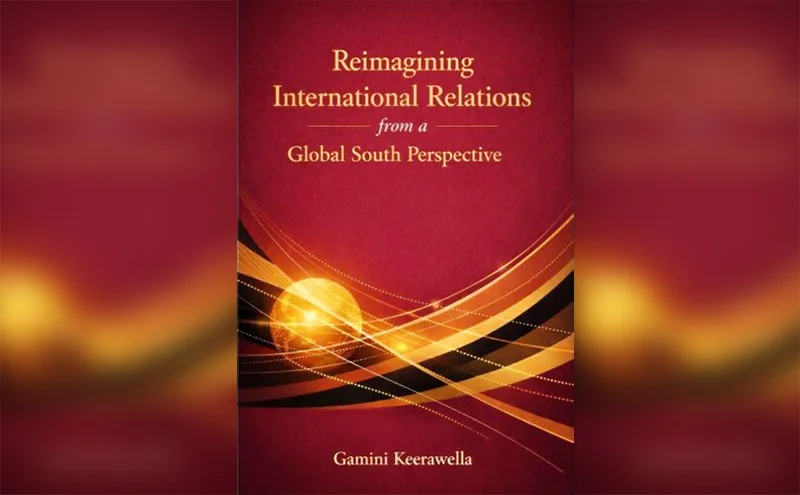
I wish to congratulate Prof. Keerawella, for having undertaken this mammoth task of seeking to capture, from ‘a global south perspective’, the multiple facets of scholarship of International Relations. He has, as always, been meticulous in his research, and also lucid in conveying to the reader, complex ideas and their interconnections, in an uncomplicated way. I am not in the habit of encouraging taking shortcuts, particularly with my students around – but if pressed, here is a book, with references to every major scholar in the 7 areas identified, in 440 pages, at a modest price.
We are honoured that the Prime Minister graced this occasion, and thankful for her inspiring words. She has left much food for thought – which I am hopeful our students will consider engaging with, as they proceed with their presentations and dissertations.
This is the 7th book, in fact the 3rd authored or co-authored by Prof. Keerawella, published under the auspices of the BCIS, over the past couple of years. It is a reflection of BCIS’s continuing commitment to bring into the public domain, quality academic literature that benefits both scholars and Sri Lankan students who pass through these halls and beyond. I want to commend President Kumaratunga, for through the BCIS, continuing to support the publication of such texts, at a time individually doing so is prohibitive and also more costly to the buyer, and the Bandaranaike Memorial National Foundation (BMNF) for making this possible.
Turning to the volume launched today (24 Feb), in ‘Reimagining International Relations from a Global South Perspective’, at the outset, Prof. Keerawella makes clear that a Global South perspective is not simply a matter of geographical focus; it is an epistemic stance that seeks to recover marginalised voices, experiences, and knowledge that have long been silenced or subordinated in mainstream discourse. He goes on to emphasise that, the choice of the phrase “a Global South Perspective” is deliberate. It signals an awareness that there is no single, homogeneous standpoint from which the Global South speaks’. To speak of a perspective, then, is to situate this volume’s argument within that broader, evolving mosaic—to offer one possible articulation among many, without claiming representational authority over them. Prof. Keerawella emphasises, it is an invitation to dialogue, not a declaration of orthodoxy.
As is customary by a reviewer, I intend to take up Prof. Keerawella’s ‘invitation to dialogue’ and commencsation in the latter part of this presentation, but first let me outline the valuable insights contained in this Book, as an appetiser.
The first chapter on IR Theory, points out – in each of the ‘isms’, ingredients as it were, that could contribute to a better understanding of the ‘Global South’. Here he highlights Raúl Prebisch and Andre Gunder Frank’s ‘dependency theory’, Neta Crawford’s ‘normative constructivism’, Sanjay Seth’s ‘Decolonial Critique’ and Amitav Acharya’s concept of ‘Global IR’ as having advanced a reformist, yet transformative agenda for the discipline. He observes that, “Collectively, their respective projects of rethinking, decolonizing, and globalizing International Relations illuminate how the Global South can contribute to the field not merely as a repository of empirical cases, but as a source of conceptual reflection and theoretical innovation”.
The second chapter which examines the transformation of International Security Studies, by foregrounding the lived insecurities of the Global South—ranging from poverty and structural violence to environmental vulnerability and social fragility, demonstrates why concepts such as human security gained salience as corrective and complementary frameworks, concerning the global south.
The third chapter pays analytical attention to the dynamics of regionalism with special focus on South Asia and the experience of the SAARC. It calls for reimagining regional cooperation in South Asia beyond rigid institutional templates, advocating for inclusive, flexible, and people-centered modalities rooted in the specific political and social realities of the Global South.
The fourth chapter addresses international organisations and international regimes as central pillars of contemporary global governance, with particular attention to their implications for the Global South. The chapter reveals how Global South states have simultaneously been constrained by inherited governance structures and mobilized collective strategies to contest inequities and assert greater voice.
The fifth chapter which focuses on Foreign Policy Analysis (FPA), situates it within a rapidly evolving global environment shaped by globalisation, technological transformation, and the Fourth Industrial Revolution, paying particular attention to the strategic choices made by Global South states.
The sixth chapter traces the long historical arc of diplomatic practice, demonstrating how modes of representation, negotiation, and cooperation have evolved in response to changing political, social, and technological contexts. From a Global South perspective, the chapter underscores both the opportunities and constraints of particularly science diplomacy.
In the final chapter, Prof. Keerawella discusses the notion of national self-determination.
He underscores its contradictions in theory, and its praxis in the post-Cold War context, tracing the ways in which self-determination has been invoked and contested in modern international relations.
Besides joining a very small league of international scholars (some already referred to) who have dared to challenge Western theoretical approaches in the study of IR and sub-fields and emphasised the need for an alternative ‘Global South’ reading, Prof. Keerawella becomes the first Sri Lankan to do so in any considered manner. His volume is also rare, in that in general, few Sri Lankans have sought to engage with and contribute to the theoretical literature of International Relations and Foreign Policy. His book has the additional advantage of being released at a time ‘International Relations’ – as we have been taught it and understood it, is under severe strain to explain contemporary developments in a conceptual and theoretical manner, and there is a serious vacuum to be filled, not just in understanding, but in order to change the currentpredicament.
While the book reaffirms the ‘global south’ as a certain collective sentiment, assembling many of the conceptual building blocks and empirical insights necessary for its articulation, what it leaves to us is the task of synthesising these elements into a coherent and operational set of principles that can foster a unified front amongst the Global South, despite the vast diversity of the actors and states involved.
While I have no disagreement with Prof. Keerawella’s starting premise and end goal of the desirability of having ‘a Global South Perspective’ in the areas under study, however, as an observer and practitioner of international relations for most of my professional life since 1980
– 9 years as a journalist, 33 years as a diplomat, and post-retirement, and over 4 years from the vantage point of running IR and Strategic Studies focused institutions, while also teaching, and engaging in my own research, I do encounter some difficulty, and lament that operationally little has or is being done, to evolve a strategy that addresses the shortcomings so carefully pointed out in Prof. Keerawella’s book.
Looking back, I do not see a single cohesive ‘Global South’ consistently in play. Rather, I see a multitude of ‘Global Souths’ –depending on the issue, competing opportunistically and often working at cross purposes, and all eventually getting played out by the continuing structural heft of the ‘Global North’.
This is no fault of Prof. Keerawella, or of the rich ingredients he brings together in this volume. Rather, it reflects the political reality that the‘Global South’ recipe has not yet been fully translated into an appetising dish.
I am no chef, and time does not permit me to elaborate from the different vantagespoints
I have experienced it from – but I do believe there is a compelling case that could be made for action, which needs serious reflection and attention.
To put it another way, without making value judgements on the rights and wrongs of the respective action, I wish to pose two sets of questions, confining myself to events of the past 4 years or so;
First, what did the ‘Global South’ do in the cases of Ukraine since 2022, of Gaza since 2023, of Sudan since 2023, on actions in the South-China Sea in recent times, following the imposition of ‘Reciprocal Tariffs’ throughout 2025, or in the case of Venezuela last month?
* Did they speak together?
* Did they vote together?
* Did they fight together?
Similarly, second, what will the ‘Global South’ do, God forbid, if there is to be a conflict on Iran, Cuba, the Panama Canal, Morocco-Algeria, DRC-Rwanda, or Taiwan, tomorrow?
* Will they speak together?
* Will they vote together?
* Will they fight together?
If I were to play devil’s advocate, I would be tempted to ask: if these coalitions neither speak, vote, nor act together, what kind of analytical and normative work can the category ‘Global South’ realistically achieve? Rather than assuming a unity that does not yet exist, how might we need to refine it?
To this end, I wish to posit, that the category of ‘Global South’ could be analytically more useful, if, as Max Weber suggested, it be used as an ‘ideal type’ – that might not be realized, but must be sought to be approximated.’Global South’ functions best as a Max Weber-inspired ‘ideal type’: an abstract model used not as a description of an existing state, but as a heuristic tool to clarify the degree to which specific regions approximate or diverge from its core characteristics.
Such an approximation cannot merely be imagined; it has at least to be attempted in practice.
What I am suggesting is not utopian. Historically, there is precedent that has been realized by the Non-Aligned group of countries – which by no means perfect, but was effective in its heyday duringthe 1960s, 1970s, and early 1980s. Unfortunately, rather than being reformed and modified at the end of the Cold War, it has been tossed away.
Admittedly, those were different times, but for purposes of encouraging the dialogue and debateProf. Keerawella wanted us to have stemming from his book, and in order to draw inspiration, let me suggest 4 factors that made Non-Alignment work as an operational strategy, while it did;
* There was a clearer ‘Framework of Operation’ – the Non-Aligned MOVEMENT, which incidentally in this year we commemorate the 50th anniversary of the hosting of the 5th Summit in Sri Lanka in 1976 at this very venue the BMICH.
* There was also a clear ‘Other’ – the cold War driven Western alliance on the one hand, and the Warsaw pact countries, which had competing ideologies–and which broadly Non-Aligned countries preferred not to emulate in toto.
* There was further an alternate Politico-Economic and Legally grounded Agenda – which saw expression through the UN Special Session on Disarmament, an operationally stronger UNCTAD, and a international legal regimethe UN Law of the Sea (UNCLOS), inwhich NAM countries played crucial roles.
* There was also ‘a like-minded collective leadership’ – which, spare a few, more often than not, dared to demonstrate objectivity between the West and the East – and resisted being unquestioning followers. Though they might not have been loved by the ‘West’, or for that matter by the ‘East’, but they were broadly respected by both.
While newer formations such as the G77, the BRICS, the SCO, alongside regional groupings such as the RCEP, the ASEAN, the AU, the GCC, and BIMSTEC have sought to fill this space, they remain, at best, partial substitutes, lacking the normative coherence and political solidarity that characterized the early NAM efforts that resulted in effective collective action demands.
It is ironic, that at a time when the ‘Global North’ is in disarray, and some its own constituents have made bold to say that this is not a “transition” but a “rupture” of the US-led rules-based international order, that there is no cohesive ‘Global South’ alternative.
The real question before the ‘Global South’ today should be, as to what conditions and mechanism could lead us to position ourselves better, to consolidate such a collective, and most importantly whether there is the political will to do so?
If not, we must at least be honest about current limits – that many states with even some capacity, are compelled to hedge, while those without meaningful leverage remain largely ‘bystanders’ in the global order.
However, if we recognize that this situation is not tenable and that we wish to serve a higher cause, we should do something about it and try to create ‘sufficient conditions’ that could more actively and tangibly approximate ‘a Global South’- which can ‘bracket’ its differences, find unity in what is most important, and avoid the temptation of flirting for temporary gain or glory.
This is the thought I wish to leave you with today in the hope that, as envisaged by Prof. Keerawella, this volume will not be the last word on ‘a Global South perspective’, but a starting point for precisely the kind of critical, self-reflective conversation that can turn it into a more grounded, plural, and effective practical programme and call to action.
Speech delivered by
by Ambassador (Retd.)
Ravinatha Aryasinha,
former Foreign Secretary and Executive Director, Regional Centre for Strategic Studies (RCSS), at the launch of
Prof. Gamini Keerawella’s book ‘Reimagining International Relations from a Global South Perspective’,
at the Bandaranaike Centre for International Studies (BCIS), Colombo on 24 February 2026)
Opinion
The J.R. I Disliked — A Review of Courage, Candour and Historical Balance

The latest addition to the “Historic Thoughts” series by the J. R. Jayewardene Centre arrives with a provocative title: The J.R. I Disliked by Imthiaz Bakeer Markar. Yet beneath its seemingly adversarial framing lies a reflective and intellectually honest reassessment of one of Sri Lanka’s most consequential political figures — J. R. Jayewardene.
This publication, based on a commemorative lecture, is not merely a memoir fragment. It is a political meditation on leadership, ideological evolution, and the necessity of historical sobriety in a time when public discourse is often driven by caricature rather than careful analysis.
Candour as Political Virtue
What immediately distinguishes Markar’s lecture is its rare tone of sincerity. He openly recalls that, as a young activist, he seconded a proposal to expel Jayewardene from the United National Party — a confession that gives the work unusual credibility. In Sri Lankan political culture, where retrospective loyalty often replaces honest memory, such candour is refreshing.
Markar’s narrative demonstrates a crucial democratic lesson: political disagreement need not devolve into permanent enmity. His recollection of Jayewardene’s magnanimity — promoting a former critic based on merit rather than loyalty — reveals a statesman confident enough to transcend factional bitterness. This alone makes the publication politically instructive for a generation accustomed to zero- sum politics.
Beyond the Right–Left Caricature
One of the most valuable contributions of this text is its implicit challenge to the simplistic labeling of Jayewardene as merely a “right-wing” leader. A careful reading of Jayewardene’s own parliamentary interventions supports this reassessment.
As early as the 1940s, he warned:
“We are suffering due to an administrative system established and protected by foreign rulers… Until we are freed from this imperialist and capitalist administrative system, we will not… resolve the serious issues we face.”
This is not the language of doctrinaire capitalism. Nor was Jayewardene drawn to orthodox Marxism. Instead, his political philosophy reflected what may best be described as a pragmatic middle path — informed, arguably, by Buddhist political ethics that molded his own life.
He himself signaled this balance when he insisted Sri Lanka must learn from global systems without surrendering autonomy. His famous reply to U.S. pressure over the rubber-rice trade remains instructive:
“We do not compromise our independence in exchange for aid… from the United States or any other country.”
In an era when small states again face geopolitical bargaining pressures, this principle retains striking relevance.
Architect of Transformative Pragmatism
Markar is at his strongest when recounting Jayewardene’s political resilience. The rebuilding of the UNP after the 1956 defeat, the strategic patience during opposition years, and the eventual 1977 mandate illustrate what John F. Kennedy called “discipline under continuous pressure.”
Historically, Jayewardene’s policy legacy is too significant to be reduced to partisan memory. His role in:
· opening the economy
· establishing free trade zones
· expanding irrigation and electrification
· strengthening free education through textbooks and Mahapola
· modernising communications and infrastructure collectively altered Sri Lanka’s development trajectory.
Critics may debate the social costs of liberalisation, but no serious historian can deny the structural transformation that followed 1977. Markar rightly reminds us that many revenue streams and institutional pathways Sri Lanka relies on today originated in that reform moment.
The Independence Question Revisited
Perhaps the most intellectually compelling sections of the lecture revisit Jayewardene’s pre-independence thought. His insistence — alongside D. S. Senanayake — that Ceylon’s participation in World War II must be tied to a guarantee of freedom reveals remarkable foresight.
Equally revealing is his humanistic vision:
“Landlessness, poverty and hunger cannot be eradicated… until every vestige of foreign rule is swept away… so that English, Indian, Dravidian, etc. can work hand-in-hand.”
Here we see a leader whose nationalism was not exclusionary but developmental and pluralist — a nuance often lost in contemporary polemics.
International Realism Without Subservience
Markar’s discussion of the 1951 San Francisco Peace Conference is particularly important for younger scholars. Jayewardene’s invocation of the Buddhist maxim “Nahi verena verani” in defence of Japan’s dignity was not rhetorical flourish; it was strategic moral diplomacy.
Likewise, his firm response to foreign pressure over Sri Lanka’s trade choices demonstrates a foreign policy posture that was neither isolationist nor submissive — but sovereignly pragmatic.
In today’s multipolar uncertainty, Sri Lanka could profit from revisiting this calibrated realism.
The Necessary Balance
To his credit, Markar does not canonise Jayewardene. He acknowledges criticisms — authoritarian tendencies, the referendum extension, media tensions. This intellectual honesty strengthens rather than weakens his overall argument.
History, after all, is not served by hagiography.
Yet the broader point of the publication — and one I strongly endorse — is that Sri Lanka’s public discourse has too often magnified Jayewardene’s flaws while neglecting the scale of his statecraft. Serious scholarship demands proportionality.
Why This Book Matters Now
At a time when historical study in Sri Lanka risks being flattened by partisan narratives and social-media simplifications, The J.R. I Disliked performs a valuable civic function. It models three urgently needed habits:
Intellectual humility
— the willingness to revise earlier judgments Political generosity — recognising merit across factional lines Historical balance — weighing achievements alongside failures
For younger Sri Lankans especially, the work is a reminder that national development is rarely the product of ideological purity. It is, more often, the outcome of pragmatic adaptation — something Jayewardene understood deeply.
Final Assessment
This slim publication succeeds precisely because of its honesty. Markar’s journey from youthful critic to reflective admirer mirrors the maturation Sri Lanka’s own political analysis must undergo.
Whatever one’s partisan position, the evidence remains compelling: Jayewardene was among the most consequential executive leaders in our post-independence history — a statesman who sought, with notable pragmatism, to position Sri Lanka for social, economic and international advancement.
If this volume encourages a new generation to study his record with intellectual seriousness rather than inherited prejudice, it will have performed a national service.
And in that sense, the “J.R. he once disliked” may yet become the J.R. a thoughtful nation learns to understand more fully.
Opinion
Open letter to PUCSL on proposed electricity tariff revision
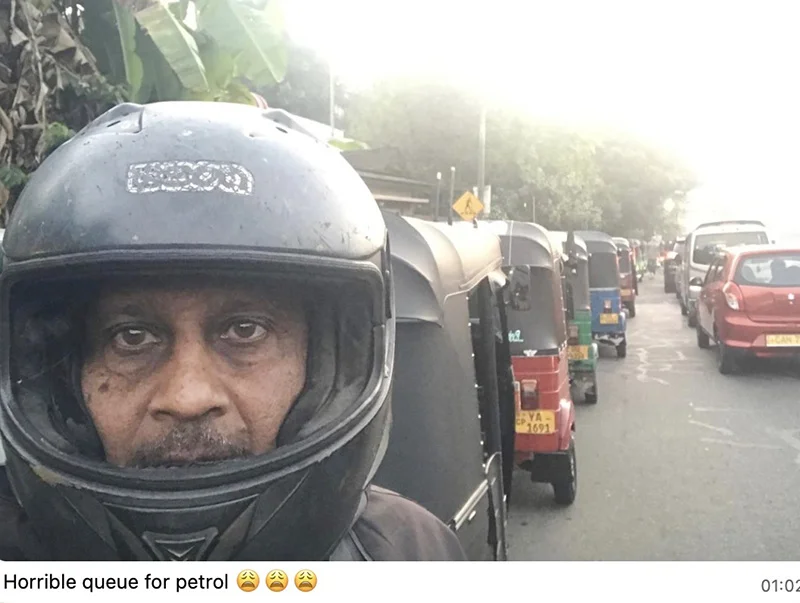
Although the Public Utilities Commission of Sri Lanka (PUCSL) has appropriately invited public consultation on the proposed electricity tariff revision from 27 February to 18 March, the online submission portal appears to contain a non-functioning submission tab. If this technical issue persists, it risks undermining the integrity and effectiveness of the entire consultation process. Consequently, I have chosen to present this letter openly for public consideration, including by the PUCSL.
Current geopolitical tensions in the Middle East underscore the urgent need for Sri Lanka to minimise its dependence on imported fossil fuels and prioritise the development of domestic renewable energy resources, including solar, hydro, and wind power. Such a transition is essential to securing a stable and independent energy supply. Regrettably, the Ceylon Electricity Board (CEB) appears to be moving in the opposite direction.
Promoting solar-powered electric vehicles supported by home-based renewable charging systems would strengthen national energy security and reduce pressure on imported fuel supplies. The fuel queues witnessed during periods of crisis, most notably in 2022, serve as a stark reminder of the risks associated with excessive dependence on external energy sources and the national anarchy that can follow.
As a small nation operating within a volatile global economy, Sri Lanka must remain as non-aligned and self-reliant as possible. Strengthening self-sufficiency in strategic sectors is critical to avoiding collateral damage amid escalating geopolitical rivalries among major powers. India has made steady progress along this path; Sri Lanka would be well-advised to do the same.
Raising electricity tariffs — a measure repeatedly adopted over the past decades to offset the high cost of fossil-fuel-based power generation — places an unfair burden on debt-ridden households and struggling businesses. Resorting once again to tariff increases, rather than addressing structural inefficiencies and fuel dependency, reflects a failure of long-term planning. The nation must instead pursue sustainable energy solutions that reduce costs over time.
As a debt-burdened country, Sri Lanka urgently requires pragmatic, forward-looking strategies that ease the pressure on citizens while strengthening resilience in times of geopolitical instability. Energy pricing is not a peripheral issue; it is a central pillar of economic stability and national security, demanding serious and immediate attention.
Established on 1 November 1969, the CEB was entrusted with the responsibility of generating and distributing electricity across the island while promoting social and economic development through the optimal use of national resources.
Recent developments suggest that the Ceylon Electricity Board has fallen short of these foundational objectives. Over the past two decades, electricity tariffs have been increased repeatedly under various justifications yet supply reliability has not consistently improved. The current proposed revision appears to perpetuate the same pattern: continued dependence on imported fossil fuels, directly contradicting the principle of optimally utilising national resources. This trajectory risks returning the country to recurring crises, including the prolonged fuel shortages and power cuts experienced in recent years.
Energy is not an ordinary commodity confined to a single sector; it affects every dimension of national life. High energy costs increase the cost of living by inflating expenses related to food production, transportation, manufacturing, and consumer goods. Ultimately, these costs are borne by citizens.
Moreover, elevated energy prices undermine national competitiveness by discouraging foreign investment and constraining local entrepreneurship, technological advancement, industrial expansion, and job creation. High-cost energy impedes national development.
Low-cost energy should therefore be formally adopted as a national policy objective. The CEB must adhere to its original mandate of optimising national resources for cost-effective electricity generation. Any deviation from this principle must be fully transparent and supported by clear, evidence-based justification.
Even in the sphere of renewable energy, concerns arise about the apparent preference for large-scale solar and battery storage projects that require substantial public funding. Previous claims of “grid instability” attributed to household rooftop solar generation were used to justify policy shifts. If electricity generated by rooftop solar during daylight hours was considered problematic, how would significantly larger solar installations differ in principle? Without systematic and transparent grid modernisation, such projects risk becoming costly stopgap measures rather than sustainable long-term solutions.
Poorly planned initiatives could once again expose the country to high delivery costs, reflected in elevated tariffs. They may also increase the risk of power disruptions due to battery limitations, spare-part shortages, infrastructure weaknesses, or maintenance failures. Sri Lanka has previously endured six- to ten-hour power outages, with severe economic and social consequences. The nation cannot afford a return to such instability.
It must also be recognised that rooftop solar installations, financed by homeowners — often through personal loans — have provided a crucial safety net for many families. By purchasing surplus energy from these “prosumers,” the system has functioned in a mutually beneficial manner for both households and the nation. Rather than discouraging decentralised generation, Sri Lanka should modernise its grid and meaningfully integrate citizen-led energy production. Short- and medium-term grid improvements could be facilitated through structured private-sector participation, including by prosumers themselves.
Globally, affordable energy underpins economic growth. Countries such as China, the United States, Norway, Brazil, and Canada have leveraged domestic energy resources to produce cost-effective power and accelerate development.
Sri Lanka must adopt a clear national policy centred on low-cost energy, fully utilising its natural endowments — solar, hydro, wind, and emerging technologies. Proposals prioritising imported fuels should be considered secondary and strictly transitional.
A nation that endures long queues for essential energy supplies cannot reasonably expect its citizens and businesses to remain productive and resilient. These realities are fundamentally incompatible.
Encouraging decentralised energy production would:
* Reduce the cost of living
* Improve national resilience
* Attract foreign investment
* Create employment
* Enhance export competitiveness
The people have entrusted the government with this responsibility. The time has come for a decisive, transparent, and forward-looking policy shift.
Chula Goonasekera
(cgoonase@sltnet.lk)
A concerned citizen
-

 Features3 days ago
Features3 days agoBrilliant Navy officer no more
-

 Opinion6 days ago
Opinion6 days agoJamming and re-setting the world: What is the role of Donald Trump?
-

 Features6 days ago
Features6 days agoAn innocent bystander or a passive onlooker?
-

 Opinion3 days ago
Opinion3 days agoSri Lanka – world’s worst facilities for cricket fans
-

 Business6 days ago
Business6 days agoAn efficacious strategy to boost exports of Sri Lanka in medium term
-

 Features4 days ago
Features4 days agoOverseas visits to drum up foreign assistance for Sri Lanka
-
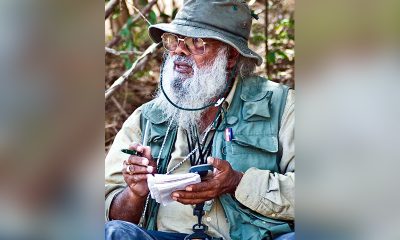
 Features4 days ago
Features4 days agoSri Lanka to Host First-Ever World Congress on Snakes in Landmark Scientific Milestone
-

 Features3 days ago
Features3 days agoA life in colour and song: Rajika Gamage’s new bird guide captures Sri Lanka’s avian soul


